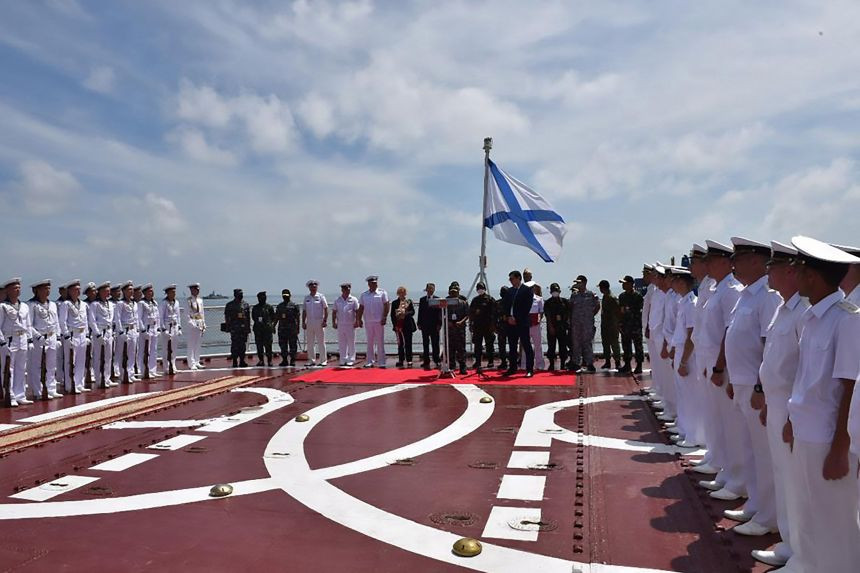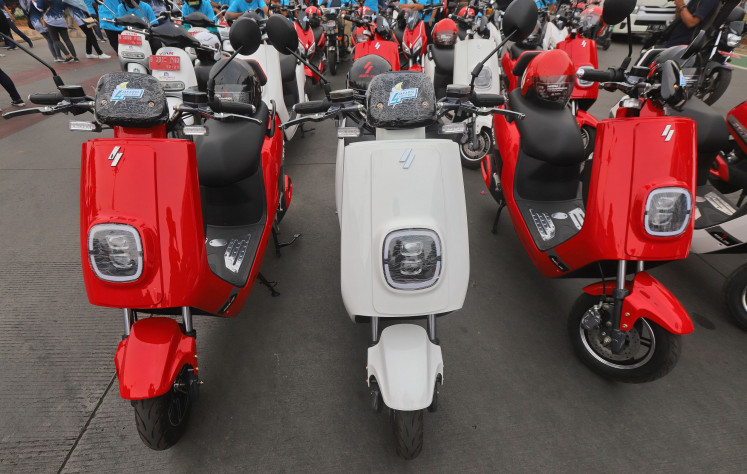Indo-Pacific gets crowded as Russia, ASEAN hold naval drills
Russia's participation in naval drills on the Indonesian coastline adds to the flurry of interest in the increasingly contested Indo-Pacific.
Change text size
Gift Premium Articles
to Anyone

R
ussia kicked off its first ever joint naval exercise with ASEAN member states in the Malacca Strait on Wednesday, making the Eastern European country the latest actor to show a keen interest in the increasingly contested Indo-Pacific region.
The exercise aims to upgrade interoperability among the navies involved and improve regional security in the maritime trade route, a strategic chokepoint that links the Indian and Pacific oceans and facilitates 40 percent of global trade.
Dubbed the ASEAN-Russia Naval Exercise 2021 (Arnex 2021), the three-day exercise was held in waters linking Belawan in North Sumatra and Sabang in Aceh, with Indonesia acting as its host. The location was scouted due to its proximity to other ASEAN states, which allows easier deployment of warships from neighboring countries.
Led by Marine Col. Wawan Trisatya, the exercise involves a number of warships and aircraft from the Russian Navy and navies from ASEAN member states.
Indonesia has deployed its Martadinata-class frigate KRI I Gusti Ngurah Rai, while Russia is deploying its destroyer Admiral Panteleyev, an Udaloy-class vessel. Singapore, Malaysia, Thailand, Myanmar, Vietnam and Brunei have also deployed their own warships, while other member states have sent observers.
Indonesia’s First Fleet (Koarmada I) commander Rear Adm. Arsyad Abdullah said the exercise was considered a strategic move to bolster military cooperation in the region.
“The importance of this exercise is to establish diplomatic relations that could build military cooperation in the ASEAN region as well as between ASEAN and Russia,” Arsyad told reporters aboard the KRI Lepu-861 after the opening ceremony on Wednesday.
The opening ceremony was attended by the Russian Ambassador to ASEAN Alexander Ivanov, Russian Ambassador to Indonesia Lyudmila Vorobieva, navy attachés of ASEAN member states and a representative from the Defense Ministry.
Ivanov said that the joint exercise was a “historic moment” in ASEAN-Russian cooperation, while insisting that there was no “hidden agenda” behind the drills.
“We are opening a new page in strategic partnerships with ASEAN countries,” Ivanov said.
Strategic reimagining
The exercise was first proposed by Russia in early 2020 when Indonesia was still the official country coordinator for ASEAN-Russia relations. The Defense Ministry brought up the plan through the ASEAN Defense Ministers’ Meeting (ADMM) in December last year, at which it was approved.
ASEAN has held similar exercises with the United States in 2019 and with China in 2018.
Russia’s newfound interest in Southeast Asia follows a whirlwind of diplomatic engagement from other regional actors, most prominently the US and China, whose rivalry is increasingly being played out in the Indo-Pacific.
The Indo-Pacific is a strategic reimagining of the Asia-Pacific region in terms that are interpreted in different ways by different countries and interests, but observers note that it generally aims to exclude China. Several countries such as Japan, Australia and India have offered their perspective on the region, as do the European Union and individual member states.
Indonesia itself has responded to this contest of strategies by proposing the adoption of an ASEAN outlook on the Indo-Pacific, which promotes an “open, inclusive, transparent and rules-based” order, setting itself apart by not alienating China.
Meanwhile, the US has only recently renewed interest in engaging with ASEAN through high-level visits and participation in its flagship events, after a dry spell under former president Donald Trump.
Military analyst Connie Rahakundini Bakrie suggested that Russia’s growing interest in the region was in response to the increasing presence of various military players, most notably in the form of the recently announced security pact between Australia, the United Kingdom and the US, dubbed AUKUS.
However, in addition to AUKUS, the increasing presence of other NATO members in the region, including France, which is pursuing its own Indo-Pacific strategy, has also added to the urgency.
“We are seeing more players in the region, not only the US and China, which is why we need a stronger Indonesian Navy,” she said.
Complicated timing
Meanwhile, the surge of Indo-Pacific interest comes at a time when Indonesia is finding itself in a dilemma vis-a-vis China.
On Tuesday, Defense Minister Prabowo Subianto met virtually with his Chinese counterpart Wei Fenghe to discuss various bilateral and regional issues, just a day before a report was published on China’s alleged protests over Indonesian drilling activities in the North Natuna Sea.
The sea borders the highly disputed South China Sea, where some ASEAN member states have been locked for decades in territorial disputes with China, which claims sovereignty over most of the waters and is building up military infrastructure and artificial islets to back it up.
Reuters claimed in the report that China had told Indonesia earlier this year to stop drilling for oil and natural gas in maritime territory that both countries regard as their own, to which a lawmaker, Muhammad Farhan, responded with a firm “No”.
Farhan was not immediately available for further comment, while a Foreign Ministry spokesman said that “diplomatic correspondences are private in nature”. A statute of limitations prevents state secrets from being disclosed until after 30 years.
China and Indonesia do not have overlapping territorial claims, but China’s self-proclaimed “Nine-Dash-Line” over the South China Sea – declared void by an international tribunal in 2016 – has led Beijing to insist that it has legitimate rights and interests in “relevant” waters.
Indonesia has rejected such claims, including through a diplomatic note to the United Nations secretary-general last year, maintaining that China’s historic claim to the sea “clearly lacks international legal basis".
Rizal Sukma, a senior researcher at the Centre for Strategic and International Studies (CSIS), said that if China’s reported protests turned out to be true, it was against the interest of both sides to change Indonesia’s policy of maintaining strategic autonomy.
“This episode clearly suggests that there might be a limit to ‘quiet diplomacy’. If the problem continues, perhaps, we’ll need to tell the Chinese directly, and in a much more forceful way, about our concerns and interests,” he said.









